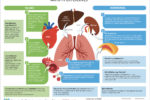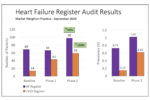We have all seen paintings of early physicians looking at flasks of urine to give an indication of a person’s health. And most of us can remember days of rows of urine pots lined up to test for new patients in primary care and in hospital outpatient clinics. We may assume that those days have gone in the era of blood testing and CT scans. So why do we have a cluster of urine pots on the cover of this issue of BJPCN and why are we suggesting that urine testing has a central role in finding patients with previously undiagnosed cardiovascular disease?























